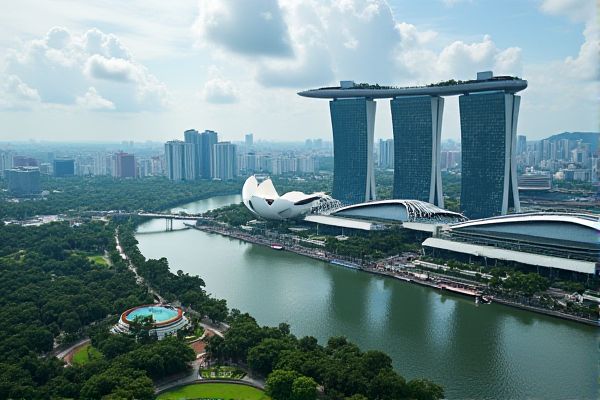
Education system and best schools in Singapore: Highly ranked global education system. Bilingual policy in schools. Focus on STEM subjects. Primary education is compulsory. National exams: PSLE, O-Levels, A-Levels. Autonomous and independent schools options. International and private school availability. Emphasis on extracurricular activities. Holistic development approach. Competitive school admission process.
Highly ranked global education system.
Singapore's education system is highly ranked globally, known for its world-leading performance in international education, with a focus on a narrow but deep curriculum and a structured, centralized approach that emphasizes thorough understanding of the syllabus before progression. To learn more about the detailed features and achievements of this system, explore the comprehensive overview on Education in Singapore. This approach has consistently resulted in excellent outcomes for students, setting a benchmark for educational success worldwide.
Bilingual policy in schools.
Singapore's bilingual policy mandates the learning of two languages from primary to secondary school, emphasizing English and a mother tongue language, such as Mandarin Chinese, Malay, or Tamil, corresponding to the student's ethnic identity. This approach is designed to foster bilingualism and cultural understanding. For a deeper insight, explore the concept of Bilingualism as a cornerstone of Singapore's educational strategy and societal cohesion.
Focus on STEM subjects.
In Singapore, STEM education is a cohesive curriculum integrating Science, Technology, Engineering, and Mathematics, introduced from the preschool level and supported by the Ministry of Education, with a focus on real-world applications and problem-solving skills. Top schools like Nexus International School and XCL World Academy enhance this with state-of-the-art facilities and innovative programs such as makerspaces, robotics, and coding. For more detailed insights and guidance, visit the Complete Guide for Parents on STEM Education, where you can explore how these educational strategies are shaping the future of young learners in Singapore.
Primary education is compulsory.
Primary Education in Singapore is mandatory for all Singapore citizens born after 1 January 1996 and residing in Singapore. Attendance is required in national primary schools unless an exemption is granted. The aim is to provide a solid foundation for further education while enhancing national identity and promoting social cohesion. For more information on these requirements and the importance of primary education, visit the official Ministry of Education website.
National exams: PSLE, O-Levels, A-Levels.
In Singapore, the education system is structured around key national exams. Primary school culminates in the Primary School Leaving Examination (PSLE) at the end of Grade 6, which determines secondary school placement. At the secondary level, students are streamed into Express, Normal (Academic), or Normal (Technical) tracks. These tracks lead to the prestigious Singapore-Cambridge General Certificate of Education (GCE) Ordinary or Normal Level (O-Level or N-Level) qualifications. Students who complete O-Levels may proceed to pre-university programs to take A-Levels, a prerequisite for university admission.
Autonomous and independent schools options.
Autonomous schools in Singapore follow the Ministry of Education's syllabus but have the freedom to add extra curriculum and activities, resulting in slightly higher fees. Independent schools, however, have full autonomy to set their own curriculum, non-academic programs, and fees, and are highly selective and elite, with schools like Raffles Institution and Raffles Girls School being among the top independent schools.
International and private school availability.
Singapore hosts a diverse range of international and private schools, with over 90 international secondary schools providing curricula like British, American, and French. These institutions cater to a variety of needs, offering different fees and facilities, and frequently imparting education in English alongside other languages. For more detailed information about these educational options, the Singapore Education System can be a valuable resource, giving insights into the structure and offerings of these schools.
Emphasis on extracurricular activities.
In Singapore, extracurricular activities (CCAs) are an integral part of the education system, particularly in International and local schools, where students can choose from a wide range of activities including sports, clubs, societies, uniformed groups, and visual and performing arts. Many schools offer over 100 different CCAs to foster a well-rounded education and community engagement. For more information about the diverse options available, the International Schools are a prime example of institutions that integrate CCAs into their educational framework, demonstrating their commitment to nurturing versatile individuals ready to contribute to society.
Holistic development approach.
Singapore's education system emphasizes holistic development, focusing on lifelong learning, social-emotional skills, character and values, physical well-being, and co-curricular activities to foster well-rounded individuals prepared for a complex global environment. The approach aims to nurture an array of competencies, ensuring students grow into resilient, adaptable, and conscientious members of society. For a deeper understanding of this comprehensive approach, consider visiting SAP's website, which delves into nurturing holistic development in Singapore's education system.
Competitive school admission process.
In Singapore, the competitive school admission process is largely determined by the Primary School Leaving Examination (PSLE) and subsequent streaming into different secondary school tracks such as Express, Normal Academic, and Normal Technical. With new reforms introducing a more flexible Subject-Based Banding scheme from 2024, the landscape of education is evolving to accommodate diverse learning needs. International students face additional challenges, including admission exams and prioritized enrollment for citizens and permanent residents. For more detailed insights into these developments, you can visit the Singapore Education System on Expatica.
